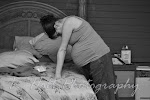So what on earth am I talking about with that title? Well, pretty much exactly what I said.
There have been many times I've heard a woman talk about her "emergency" birth story. Labor progressed quickly (she may be home or she may already be in the hospital) and she feels pushy. Let's say she's at home and on the phone with a 911 dispatcher (or her spouse/friend/kid/dog/etc is) and she feels an overwhelming urge to push. But alas, she is told to FIGHT against her body's natural desire and force to prevent the baby from being born until help arrives. Let's say the woman was in the hospital and the doctor isn't there, but of course he will be soon, so she's told by her nurses to resist the urge to push.
Now, I've felt that urge to push, in fact, I've been that woman at home in full blown labor ready to have a baby and I can tell you if you don't know for yourself, there is NO way you're going to fight that urge. It doesn't do you any good, anyway. If the urge to push has come, your body will literally birth the baby without your help. So you can push to help it or let it happen on it's own...either way, you're havin' a baby!
So for the rest of this blog I am not speaking as a homebirth or out of hospital birth advocate. I am speaking solely for the purpose of educating on "emergency birth", that is birth outside of how it was planned to take place.
I'm not naive, so I know that 3% of US women are choosing to birth with midwives and only 1% are choosing to birth at home. That being said, EVERY woman should be prepared for an unassisted home birth. I repeat: EVERY WOMAN SHOULD BE PREPARED FOR AN UNASSISTED HOME BIRTH.
Why?
Well, because you NEVER know what's going to happen. You need to trust that birth truly IS normal and that it is very rare that complications arrive especially when the process is left to happen naturally. It may be your second or third baby and labor just progresses quicker than expected or perhaps you handle your contractions very well and don't realize you're truly that close to birthing. Whatever the reason, you're now at home and about to have a baby. Quick, what do you do?
First, you RELAX and calm down and trust in this process.
Second, you let your support person and doctor/midwife/witch doctor know that you are in full blown labor and baby will be coming where you're at.
Third, get COMFORTABLE. Listen to your body, what does it want? Should you be squatting with support? Or is laying on your side more comfortable? Listen and do that.
Next, breathe through your contractions and push when your body tells you to push. If you have a partner there, have them get you some sheets or towels for the birth mess. Don't be afraid if your water hasn't broken, most bags of water don't break until the pushing phase. The towels will help to keep this mess under control. If fluid is clear: awesome. If meconium is present, that's ok. If the baby happens to aspirate the meconium, they can be suctioned. Many hospitals/midwives/birth centers are no longer suctioning for meconium unless they know the baby has swallowed some. So, you're still good to go.
*Do not have your support at any time check you for dilation*
As you and your body are pushing together, have your partner prepare to catch the baby. If you don't have someone there, try to get in a position so that you can gently welcome baby to this world. Don't pull the baby out, continue to push with your body. It may help to take a little rest after the head is birthed before you push the baby the rest of the way out. If you notice the cord around the baby's neck, don't be alarmed. Nuchal cords are present in 1 in every 3-4 births, wrapped at least once. This is not an emergency but rather another variation of normal. If you're able, simply loosen the cord and slip it off the baby's neck, then push to deliver the body.
You may notice that when your baby is first born, they are gray or bluish in color. Don't be alarmed. When your baby passes through the birth canal, up to half of their blood volume is pushed back up in to the placenta. As long as the cord is thick and pulsating, they are receiving nutrients and oxygen from the placenta. There is no need to clamp or tie off the cord. Many people let the cord finish pulsing on it's own so the baby gets vital blood that was lost back to the placenta, this helps reduce jaundice and other complications in newborn babies. As your baby's blood begins to circulate, they will "pink up", you can rub them to help get the blood moving, and skin to skin contact is vital to keep them warm.
If able, bring the baby skin to skin and begin nursing. Nursing immediately after birth will help with any post partum bleeding and can reduce hemorrhaging. If you notice that your baby's umbilical cord is short and they cannot reach your chest, hold them lower on your abdomen, DO NOT tug on the cord. The placenta can stay attached to the uterine lining for 30-60 minutes, so let the after contractions do their work and release the placenta. You may push it out when you feel the need, if help hasn't arrived yet.
In the event that the cord was short and your baby appears hungry or you feel the need to nurse immediately, try to push. It's not in your best interest to cut the cord without sterile scissors, as you don't want to risk an infection to the baby. If your placenta is not coming out, just be patient and wait for help. Don't attempt to tug on the cord and manually remove the placenta. Bend down/over to nurse if you need to.
If the cord was long enough for baby to be brought to breast, keep nursing until your help arrives or you're able to birth the placenta. Keep baby, cord and placenta intact without properly sterilized scissors.
That's pretty much it, you've had a baby. Congratulations.
Regardless of where you plan to birth or who you plan to attend you during that momentous occasion, it is wise to be prepared for anything and to know what is truly required, and what else is not. The easiest thing to remember in an emergency birth situation like this, is that less is more. Hopefully all of you get the births you're planning, but for those who end up in a situation that's, to them, less than ideal, be well informed.
Subscribe to:
Post Comments (Atom)








2 comments:
Thanks for this! I concur that EVERY WOMAN should know what to do in an "emergency" birth situation. Hell, I kinda think that EVERY PERSON should know what to do, in case they're ever in the position to help an unexpected birth. Right up there with CPR, you know? :)
I fully agree (obviously). There is a lot of fear surrounding birth and it will take a lot to back track that damage, but regardless, it is pertinent to know what to do. On one of those "incredible birth story" shows, a woman delivered on the side of the freeway after getting pulled over and the cop cut the cord with something (box cutter, scissors...) and the baby got an infection because it wasn't sterile...if only they'd known it wasn't at all necessary to cut it in the first place.
Post a Comment